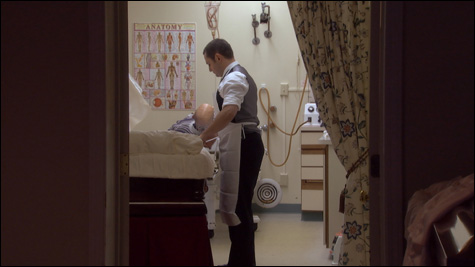
THE TRIP DOWN: Lynch and Sons stick up for the dead guy. |
When it comes to it, I think I’d like to be laid below for the long rest. My wife, on the other hand, would prefer her remains to be combusted into the atmosphere, where she can dance among the gases. Such temperamental differences are the stock-in-trade of Lynch and Sons, the firm of funeral directors in Central Michigan whose work — whose calling, perhaps I should say — is the subject of Frontline’s The Undertaking (WGBH Channel 2, Tuesda, 9 pm). The firm’s most famous son is Thomas Lynch, the poet and memoirist whose 1997 book The Undertaking: Life Studiesfrom the Dismal Trade has been repeatedly recommended to me. Having seen him at work with his fellow Lynches, I am now going to read it. In a voice that seems to have been permanently adjusted to the hush of the funeral parlor, Lynch lays out his views: “I think we have in some ways become estranged about death and the dead. We’re among the first couple of generations for whom the presence of the dead at their own funerals has become optional. We saw people start organizing sort of these commemorative events to which everyone was invited but the dead guy.”
Sticking up for the dead guy — putting a nice tie round his neck, colouring his empty lips, massaging the rigor mortis out of his fingers, giving him pride of place — is exactly 50 per cent of a funeral director’s job. The other half of it involves the living, the left behind or about-to-be left behind, and here too Lynch and Sons appear to be exemplary: the same thoroughness and calm, white-shirted strength with which they approach the embalming process is exhibited in their dealings with those who still have a pulse. Counseling the parents of Anthony Verrino, a baby mortally sick with a genetic disorder called CFC syndrome, Thomas Lynch advises them to take their time on deciding between burial and cremation. “It’s just hard to finalize that decision. . . . ,” says the boy’s father, helplessly. “When the time comes,” Lynch promises him, “you’ll know what to do.”
And in the midst of grief, on the blackest ground, we should never be surprised to find the rude buds of comedy pushing their heads up. At a hospice bedside, Lynch is introduced to an old lady called Mary Leonard by her niece, who is making the funeral arrangements. “Cremation is what you’ve chosen,” the niece reminds her aunt. The old lady gives no sign of having heard. The niece tries again, louder this time: “Cremation? . . . AUNT MARY, WOULD YOU LIKE TO BE CREMATED?” Aunt Mary, from deep in her deathbed, emits a stoical creak of acquiescence: “Yeeerrrrsss . . . ” Frontline producers Miri Navasky and Karen O’Connor are to be commended for the limpid, unsentimental eye that the program casts on scenes like these.